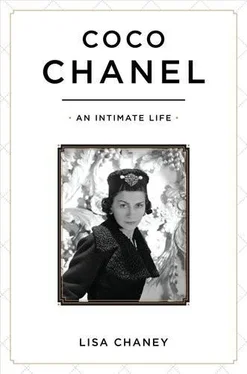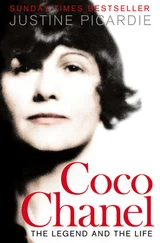Over the years, La Pausa was to gain a reputation with Gabrielle’s friends as a remarkable place. The perceptive future American Vogue editor in Paris, Bettina Ballard, who came to know Gabrielle well in the thirties, would say that it was “the most comfortable, relaxing place I have ever stayed in,” and indeed the building’s design, combined with Gabrielle’s style of hospitality, was then most unusual. In those days, when the Côte d’Azur was just coming into its own, Gabrielle led the way in creating a new style of living for the holidaying rich. Bettina Ballard continued:
In her own home she wanted to be left alone unless she wanted to be seen, and her guests had the same privilege… the house was blissfully silent in the morning…
If and when you came down, there were small unostentatious cars with drivers to run you down the mountain to swim or shop in Monte Carlo. No life was encouraged around the villa in the morning. Lunch was the moment of the day when guests met in a group and no one missed lunch — it was far too entertaining. The long dining room had a buffet at one end with hot Italian pasta, cold English roast beef, French dishes, a little of everything… Chanel hated having servants under foot, and Ugo somehow managed to run the house superbly and still keep everyone out of sight but himself. 13
The first majordomo at La Pausa was a Russian refugee, Admiral Castelain, who gave the relaxed impression that there were no other servants, and whom Gabrielle treated as a friend.
During 1929, as La Pausa was being painstakingly erected for Gabrielle and Bend’Or, their affair, however, was to founder. Gabrielle’s bid to become pregnant may well have been the trigger for Bend’Or’s return to his old routine of dalliance with pretty women. Gabrielle was a most un-jealous woman, but Bend’Or’s fling at this juncture provoked in her feelings of real insecurity. Failure to conceive was a grim reminder to this commanding woman of her ultimate inability to control life. We don’t know the details, but it seems most likely that a botched abortion during her affair with Etienne Balsan had left her unable to conceive. (One wonders if Arthur Capel would have married Gabrielle if she had become pregnant.) Gabrielle was miserable and frustrated, and her feelings sometimes turned to anger, which she would vent upon Bend’Or. This was a very bad idea. Nevertheless, for some time to come, the man whom few dared to cross would recall why he wanted Gabrielle, and he would return, bringing her gifts and his old enthusiasm and affection.
Meanwhile, another problem had rumbled on beneath Gabrielle’s determination to become pregnant: her devotion to her work. Inextricably interwoven with her life and who she had become, her need for work was ineluctable. She longed for a child, but every time she succumbed to a man, eventually Gabrielle began to hanker after work and its beloved companion, independence. In reality, she found equality with a man — perhaps with anyone — deeply challenging, which was why a man as powerful as Westminster had appeared such a good proposition.
While Gabrielle’s predicament as a woman was a reflection of her times, she also found that inescapable element of any relationship, the weighing scales of power, impossible, really, to balance for more than a few years. The deeply feminine part of her would make the poignant comment, “I never wanted to weigh more heavily on a man than a bird,” yet the other Gabrielle had an extraordinary drive to create, to organize and to lead. And she would voice her dilemma with tragic accuracy: “It would be very difficult for a man, unless he were strong, to live with me. And it would be impossible for me, were he stronger than me, to live with him.” 14
No matter what she did to avoid it, Gabrielle’s work in the end was preeminent. The unresolved motives that drove her always proved stronger than the conflicting wish for emotional fulfillment and tranquility. Yet while Westminster tried to draw her back to him, at the same time, he himself had begun to drift away.
Gabrielle’s pride was at stake here, and she was edging toward disillusionment. No longer young, she had lived too much of her life in the glare of publicity for her to support a public slighting. And while her disappointment at failing to bear a child was secretly causing her such misery, as was her way, the woman perceived as so resilient, even heartless, hid her anguish from all but one or two.
One of those always there in times of need since Arthur’s death was Misia Sert. Gabrielle would say dreadful things of Misia, most of which were true. Describing her as having no sense of moderation or rationality, she said she was like a nomad from the steppes:
She has an acute thirst for success and a deep and sacrilegious passion for failure. For herself, whom she loathes, for the man she serves… She aspires to greatness, she loves to mingle with it, to sniff it, to control it and reduce it…
She had absolutely no shame, no sense of honesty, but she had a grandeur and an innocence about her that surpassed everything one usually observes in women… it’s because of this I adored her… In woman there is everything, and in Misia there was every sort of woman. 15
Whatever Misia’s faults, Gabrielle would, nonetheless, continue to love her. Indeed, she would claim that she was the only woman who remained her true friend.
For the moment, however, Misia suffered, too, and Gabrielle came to her rescue. At her insistence, Misia had joined the Cutty Sark with a party sailing along the Dalmatian coast. While there was intermittent tension between Gabrielle and Bend’Or, Misia’s situation was more acute: her marriage was in ruins.
Sert had become besotted with a tall, narcissistic and self-destructive Russian princess, Roussadana Mdivani. Finding her beauty luminous, half of the Parisian haut monde appeared besotted, too. Roussadana’s brothers’ indigence led them to use their exotic charm and titles to make marriages with a series of American film stars and heiresses, acquiring for them a moniker, “the marrying Mdivanis.”
Meanwhile, Misia had worked her way through the repertoire of attitudes for the long-suffering wife. But her accustomed open-mindedness, as she waited for another of her middle-aged husband’s infatuations to subside, had, this time, been to no avail. And foolish Misia had herself also grown to love this self-absorbed and high-spirited young woman who was destroying Misia’s marriage.
When Misia had first met Gabrielle, Sert had been taken aback at her passion for yet another woman. Now his wife’s ardor for another woman only heightened his own desire for Roussadana, who so intertwined herself with their lives that the three of them no longer understood their motivation or their emotions. Geared as Sert was to the world of “fashion, the rich and the vaguely talented, he had moved from Misia’s lightness, with its solid basis of art, to Roussy’s frivolity, with its nihilistic base of chic.” 16In time, Gabrielle became more than a little besotted herself with the captivating creature, but for now, in hour-long conversations on the phone, she admonished Misia for involving herself with the girl, telling her she was playing a dangerous game. Misia replied that the forces that drew people toward calamity had her in their clutches and that she was powerless to do anything but try to subdue disaster.
Gradually, her increasing doses of morphine failed to keep her far enough removed from her emotions, and she was faced with the despair she really felt. Paul Morand would recall his admiration for Misia’s “joie de vivre, always concealed beneath a mask of ill-humor; that perfect poise even in moments of despair.” It must have been hard work indeed for Misia and Gabrielle to retain their legendary poise while concealing their real feelings from everyone — except each other — on board Bend’Or’s pleasure ship.
Читать дальше












